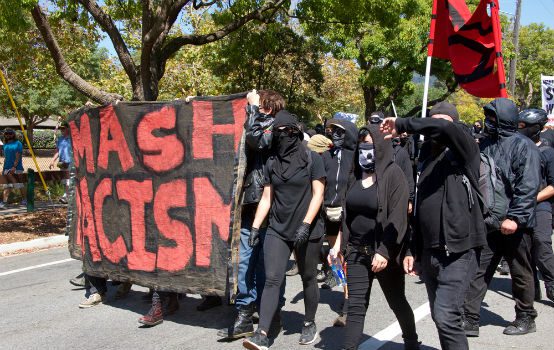Neo-Jacobins Demand Zero Tolerance, Or Else

Recently, the University of California at Berkeley paid approximately $600,000 for security so their chapter of Young Americans for Freedom could host conservative pundit Ben Shapiro without riots breaking out. Similarly, Reed College was forced to cancel the first meeting of its core “Introduction to Humanities: Ancient Greece and the Mediterranean” class—which has been mandatory for freshman since 1943—after students objected that the course was Eurocentric and racist, and disrupted its classes. These protests are increasingly common on college campuses. They’re almost always carried out in the name of denying alleged oppressors a platform to spew “hateful” rhetoric.
But it’s a recent incident at the College of William and Mary that provides the best window into the disruptors’ way of thinking. A speech by a representative of the ACLU was interrupted by protesters who objected to the group’s defense of First Amendment rights for everyone—including white supremacists—and demanded zero tolerance for views they deem unacceptable. If one sorts through their various chants and screams, it becomes readily apparent why they reject free speech: they view it as an inherently conservative institution that stands in the way of “progress.”
The best label for these students is “Jacobin,” even if it’s unlikely many of them would refer to themselves that way. Historically, the Jacobins were a faction in the French Revolution that carried out the Reign of Terror and orchestrated the genocidal suppression of the reactionary Catholic and Monarchist counter-revolutionaries. While the original Jacobins are long gone, the spirit of their revolutionary ideology lingers, seeking nothing less than to end evil itself by sweeping away the status quo and replacing it with a new and just order.
Campus Jacobins, like many of their fellow students, see ills like racism, sexism, and bigotry, and desire to end them. However, to the Jacobin mind, anything short of immediate and radical reform is tantamount to colluding with evil. With that in mind, it becomes clear why these students are opposed to free speech and open inquiry: trying to fix things by working out differences through words is a very slow process that allows injustices to continue existing in the short term. In the words of one student, trying to right wrongs through debate merely “tricks you into thinking social problems can be resolved if only people tolerate their oppression just a LITTLE while longer.”
The Jacobins would rather embrace revolutionary violence and tear society apart than tolerate injustices and oppression temporarily while changes are made. In the end that leaves everyone, including the oppressed, worse off. Slow positive change is much preferable to rapid and revolutionary upheaval. As Edmund Burke, the 18th-century political theorist and staunch opponent of the French Revolution, said in his Reflections on the Revolution in France, “mind must conspire with mind. Time is required to produce that union of minds which alone can produce all the good we aim at. Our patience will achieve more than our force.”
Burke argues for caution, reflection, and restraint when seeking to make necessary changes, rather than revolutions that lead to more problems that before. This requires humility and the acknowledgement that one might not possess the ultimate answer to a problem. The open and free exchange of ideas is the best way of accomplishing such a task because it allows the aggregation of knowledge and perspectives to arrive together at a general conclusion, rather than violently enforcing one conclusion on everyone. Campus Jacobins have no patience for that; despite their youth and inexperience, they’ve concluded that they already possess all the information they need, and therefore there is no need for discussion, only compliance with their demands.
Unfortunately, the oft unsaid—and perhaps unrealized—implication of the rejection of free expression is that force and violence are the only alternatives to bring about change. If one is so supremely self-assured in one’s conclusions that one sees those who hold differing views not as acting in good faith but rather perpetrating evil, then it follows that dissent should not be reasoned or compromised with but rather eradicated. When everyone does not carry out their demands merely because they demand them, the morally absolute are left only with upheaval.
Hopefully, the majority of college students see the destructive path that the campus Jacobins are heading down and choose to defend free speech and open inquiry, which has provided the basis for so much social harmony, despite our differences. If not, the future of civil coexistence looks bleak.
Zachary Yost is a Young Voices Advocate who lives and works in the Pittsburgh area.
Comments